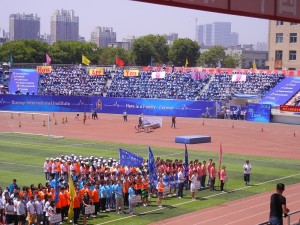This is Part Two of “Grounds for Optimism”, in which our fearless scribe goes to Chinese gardens, walking and running and thinking about things and then writing about them to dazzling effect. Part the First, on the “Humble Administrator’s Garden” in Suzhou, did its dazzling right here.

The Temple. Little bits of heaven surround it.
A few days later, in Beijing, I loosened my purse-strings again. Though I’d stayed, on a couple of prior visits, in a hotel near the Tiantandongmen station of the capital’s a-maze-ing subway system, I’d balked at the high walls and what had seemed like the rapacious price for a wander around the Temple of Heaven. (Tian Tan. Dongmen means the “eastern door” of this Ming and Qing dynasties-era complex of imperial gardens and temples.) On my second-last day in Beijing, I decided it might be worth running inside those walls, instead of on the chaotic surrounding streets. I had my usual sinking feeling at the entryway crowds, but the lines weren’t actually that long, and I found out that an entrance ticket – no access to the temple interiors, fine by me – was only 15 yuan. (You’re not paying $2.50 to go jogging, goofball. You’re running through Chinese history and culture for the price of a McChicken! Give your head a shake.)
The Tian Tan grounds are enormous, and yes, I got lost. I’d thought to run the perimeter and then see what I’d like to explore further, but after 35 wide-eyed minutes I wasn’t any particular where, as far as I could see. Well, I thought, I must be back near the East Gate by now, but I wasn’t. It didn’t matter. Even without entering The Hall of Prayer for Good Harvests – the “most famous temple in the world”, this under-educated Westerner was surprised to discover – or the Beamless Fasting Palace where Emperors purified themselves for weeks before their invocations of heaven, or viewing the Circular Mound Altar of sacrifice, I knew I’d be back for another tour the next day. Quite apart from the legends and the antiquity, there’s so much China in there, the parts just behind the walls of heavy traffic, the veils of pollution, and the look-how-modern-we-are! forests of shiny skyscrapers.
I guess I shouldn’t have been surprised, but it’s a People Place. (People’s

The Seven were just funky-shaped rocks to me. Even after reading, I didn’t get the significance.
Republic. Go figure.) There are tonnes of tourists, absolutely, but what this one liked was the locals who also paid no attention to The Divine Storehouse and the Seven-Star Stones. Folks pay, I found out from a spry old dude with careful and sufficient English, 100 yuan for a year’s pass. They come, singly and in groups, for exercise, community, art, serenity and the most amicable kinds of noise. I walked and ran and watched and listened, and for a time I just lay on a bench looking at the sky through the branches of old cypress trees. Here’s what I saw:
Continue Reading >>






